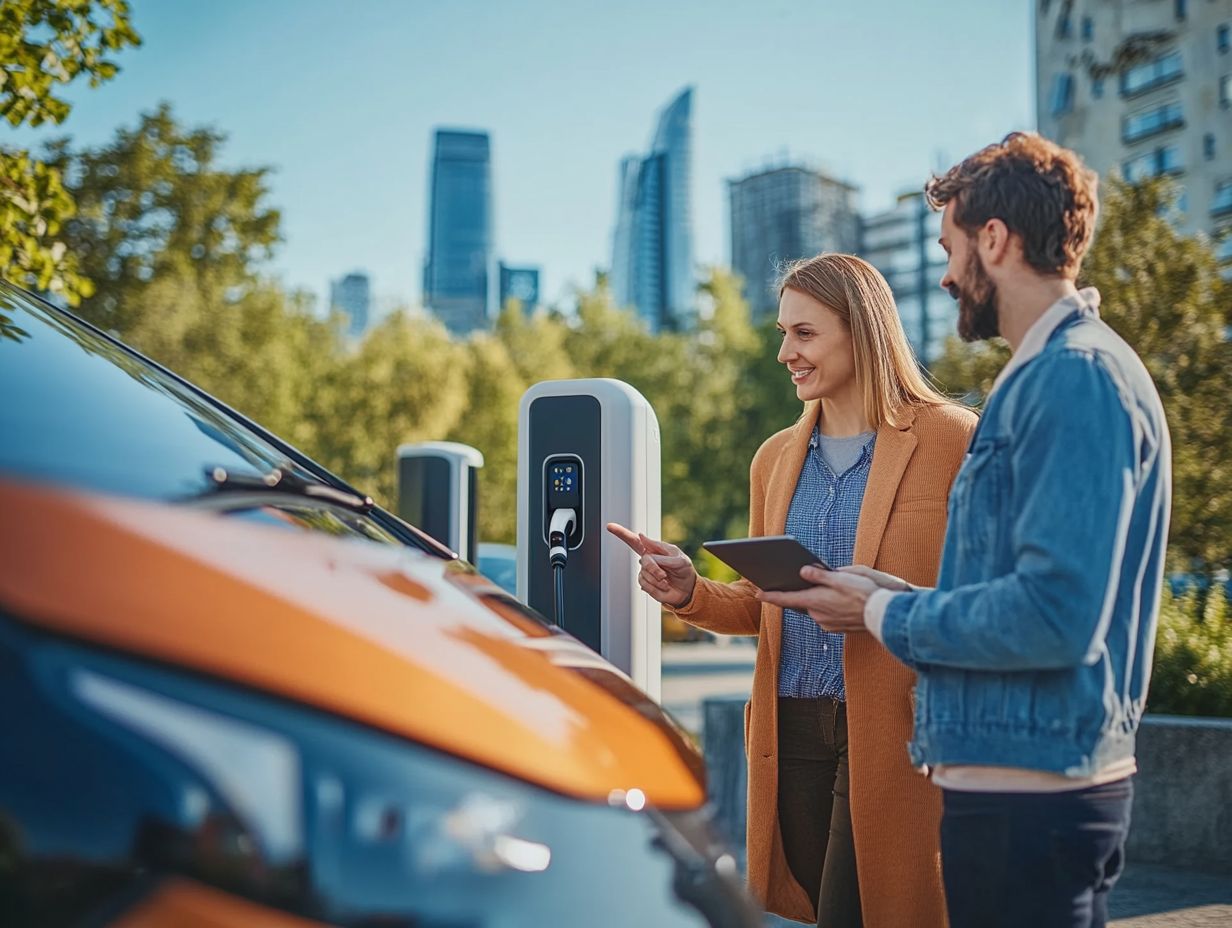Understanding Coverage for Electric Vehicles
As electric vehicles (EVs) rise in popularity, understanding the details of insurance coverage for these innovative cars is vital.
This article explores the various types of coverage available, including liability, collision, and comprehensive options.
Key factors, such as battery life and charging infrastructure, can influence your insurance rates significantly.
With the right information, you can secure the financial protection and peace of mind you need as you navigate the road ahead with your electric vehicle.
Contents
- Key Takeaways:
- What is Electric Vehicle Coverage?
- Types of Coverage for Electric Vehicles
- Factors Affecting Coverage for Electric Vehicles
- Benefits of Electric Vehicle Coverage
- Choosing the Right Coverage for Your Electric Vehicle
- Frequently Asked Questions
- What is electric vehicle insurance coverage?
- Why is it important to have insurance coverage for electric vehicles?
- What does electric vehicle insurance typically cover?
- Do electric vehicles require different insurance coverage than traditional gasoline vehicles?
- Are there any discounts or incentives available for electric vehicle insurance coverage?
- Can I add my electric vehicle to my existing auto insurance policy?
Key Takeaways:

- Electric vehicle coverage provides financial protection and peace of mind for EV owners.
- Factors like battery life and charging infrastructure can affect coverage.
- When choosing coverage, consider liability, collision, comprehensive options, and overall costs.
What is Electric Vehicle Coverage?
Electric Vehicle Coverage is a tailored car insurance solution designed specifically for electric vehicle owners, such as those who drive the Tesla Model 3. This specialized coverage recognizes the unique aspects of electric cars, including their distinct components, specific charging needs, and repair costs that differ from traditional vehicles. To learn more, check out our guide on understanding coverage for electric vehicles.
By choosing this coverage, you ensure that your insurance is comprehensive and highly relevant to your needs. As electric vehicles are taking the automotive world by storm, understanding what coverage for electric utility vehicles entails is essential, as it can significantly impact both your insurance and premium costs.
Types of Coverage for Electric Vehicles
Understanding the different types of coverage available for electric vehicles is crucial for selecting the right insurance protection for your electric car, especially as the market for EVs, like the Tesla Model 3, continues to expand. This includes knowing what is coverage for electric commercial vehicles.
Your coverage options typically include liability coverage, which helps pay for costs if you cause an accident, and collision and comprehensive coverage, which protect your vehicle from risks such as theft and natural disasters.
Each type of insurance serves a distinct purpose, and knowing these differences allows you to optimize your protection while managing your insurance costs effectively.
Liability Coverage
Liability coverage is essential for you as an electric vehicle owner, protecting you from financial loss that may arise from damages you cause to others in an accident. Often mandated by state laws, this coverage ensures that your insurance provider takes care of costs related to bodily injury or property damage if you re found at fault. It s a crucial part of your electric vehicle insurance policy.
Understanding the details of liability coverage is crucial for electric car owners, especially as these vehicles gain popularity on the roads. Various insurance providers offer different levels of liability coverage, which can significantly affect your premiums. Some may provide the basic minimum coverage, while others offer enhanced options with greater amounts or additional features, like legal fees or uninsured motorist protection.
As an electric vehicle owner, it s important to compare these options carefully. Choose a policy that meets legal requirements and aligns with your personal needs and budget.
Explore your insurance options today and drive with confidence in your electric vehicle!
Collision and Comprehensive Coverage

Collision and comprehensive coverage are essential for electric vehicle owners. They protect against risks that could impact your car, like the Tesla Model 3. Collision coverage pays for your repairs after an accident, while comprehensive coverage protects against non-collision incidents such as theft, vandalism, or natural disasters. Together, these coverages create a robust safety net, helping to alleviate the steep repair and insurance costs often associated with EVs.
Understanding these distinctions is vital for safeguarding your investment. If your electric vehicle gets into a collision, collision coverage activates, covering your repair expenses and allowing you to get back on the road swiftly. Now, imagine a severe storm damaging your electric vehicle or tree branches causing significant harm. Having a solid grasp of coverage for limited use vehicles ensures you won’t be left with overwhelming costs.
By using both types of coverage, you can navigate potential hazards smoothly, enhancing your peace of mind as you enjoy the ride in your environmentally friendly vehicle.
Factors Affecting Coverage for Electric Vehicles
Several factors influence the insurance coverage available for electric vehicles, including battery costs and the availability of charging infrastructure. Understanding coverage for electric scooters is crucial, as these elements can directly impact your overall insurance costs, monthly payments, and the potential for specific discounts.
States like California and Colorado offer unique insurance options shaped by their EV-friendly policies and ample charging facilities, influencing coverage rates for electric car owners.
Battery Life and Replacement Costs
Battery life and replacement costs are essential when considering electric vehicle insurance. High-performance batteries, such as those in the Tesla Model 3, may need replacement after several years, leading to potentially hefty expenses.
Understanding the impact of battery performance on your insurance will empower you to make informed decisions about your EV policy. The lifespan of an EV’s battery affects possible repair and replacement costs and plays a vital role in shaping your overall coverage.
As you weigh these expenses, you might find certain policies offer better protection specifically designed for electric vehicles. These considerations can drive up costs, especially for models known for expensive battery replacements.
As a future EV owner, you must assess your insurance options thoroughly and select a plan that balances comprehensive coverage and affordability. This way, you can ensure you’re well-protected against unexpected battery-related costs.
Charging Infrastructure
The presence of robust charging infrastructure greatly affects your insurance coverage options for electric vehicles. In regions with extensive charging networks, such as California and Colorado, you might find more favorable insurance rates since the risk of being stranded without charging options is reduced. Understanding how charging infrastructure influences your coverage allows you to choose the best insurance provider.
For electric vehicle owners, this means looking beyond just the premiums you pay; it’s also about policy features that meet your charging needs. In areas with limited charging stations, insurance policies that include roadside assistance or cater to longer distances can be particularly valuable, ultimately affecting your overall costs.
As adoption rates vary between urban and rural settings, so do your coverage options. Urban residents may face different risk assessments than those in less populated areas. Therefore, evaluating the accessibility of local charging stations is essential for making informed insurance decisions that could lead to significant savings and improved protection.
Benefits of Electric Vehicle Coverage

Electric vehicle coverage has many benefits. It offers financial protection and peace of mind for owners, like those of the Tesla Model 3. With comprehensive coverage for electric cars specifically designed to address the unique needs of electric vehicles, you can drive with confidence, knowing you’re safeguarded against unexpected events, from accidents to theft.
Many insurance providers offer discounts just for electric vehicle owners, amplifying the financial benefits that come with choosing electric vehicle insurance.
Financial Protection and Peace of Mind
Securing electric vehicle insurance provides you with both financial protection and peace of mind. With the right insurance in place, you can navigate the roads confidently, knowing that both your vehicle and your financial well-being are safeguarded in the event of accidents or damages.
This assurance proves invaluable in situations ranging from minor fender benders to major collisions. For example, if a sudden storm damages your charging station or you fall victim to a hit-and-run, having the appropriate policy can make all the difference between a seamless recovery and a looming financial headache.
Comprehensive insurance covers unexpected events, including theft and damage not caused by a collision. It eases the stress that follows an accident, allowing you to concentrate on recovery rather than worrying about repair costs. With reliable insurance, you can enjoy every moment in your eco-friendly ride without worries!
Choosing the Right Coverage for Your Electric Vehicle
Selecting the ideal coverage for your electric vehicle requires a thoughtful evaluation of various options tailored to your specific needs. This includes understanding coverage for electric motorcycles, as well as premium costs and insurance providers.
As the electric vehicle market continues to expand, a wider array of insurance options designed specifically for EVs emerges. This gives you the opportunity to find policies that align with your requirements.
Considerations such as the type of vehicle you own, your driving habits, and regional regulations are crucial elements in this decision-making process.
Factors to Consider
When choosing coverage for your electric vehicle, it s essential to weigh several factors. These include your driving habits, the specific model you own, and the unique insurance options available to you.
Understanding how these elements interact can empower you to select a policy that not only provides excellent protection but also optimizes your insurance costs.
For example, if you frequently commute long distances, your coverage needs will differ from someone who mainly uses their vehicle for short trips. Additionally, understanding coverage for specialty vehicles like electric models, whether a compact or a luxury sedan, can significantly impact both your coverage requirements and premiums.
Regional regulations concerning electric vehicles also play a pivotal role; in some areas, you might find incentives or discounts that can positively influence your insurance rates. By evaluating these factors, you can navigate the complexities of electric vehicle insurance more effectively and craft a plan that aligns perfectly with your lifestyle and budget.
Frequently Asked Questions

What is electric vehicle insurance coverage?
Electric vehicle insurance coverage is a type of insurance that provides protection for electric vehicles against potential risks and damages, including aspects detailed in understanding coverage for non-standard vehicles.
Why is it important to have insurance coverage for electric vehicles?
Having insurance coverage for electric vehicles is important because it protects you financially in case of accidents or damages to your vehicle. It also ensures that you comply with local laws and regulations.
What does electric vehicle insurance typically cover?
Electric vehicle insurance typically covers:
- Liability for bodily injury and property damage
- Collision
- Comprehensive
- Uninsured/underinsured motorist coverage (protects you if you are in an accident with a driver who doesn’t have insurance or whose insurance is insufficient)
- Coverage for charging equipment
- Personal injury protection
Start comparing policies today to find the best coverage for your electric vehicle!
Do electric vehicles require different insurance coverage than traditional gasoline vehicles?
Yes, electric vehicles might need different insurance than traditional gasoline vehicles.
They have unique parts and technology that can lead to different risks and damage.
Are there any discounts or incentives available for electric vehicle insurance coverage?
Some insurance companies offer discounts for electric vehicle insurance.
These can include savings for using eco-friendly cars or for setting up home charging stations.
Can I add my electric vehicle to my existing auto insurance policy?
Yes, you can usually add your electric vehicle to your existing auto insurance policy.
Check with your provider to ensure your coverage meets your electric vehicle’s needs.






